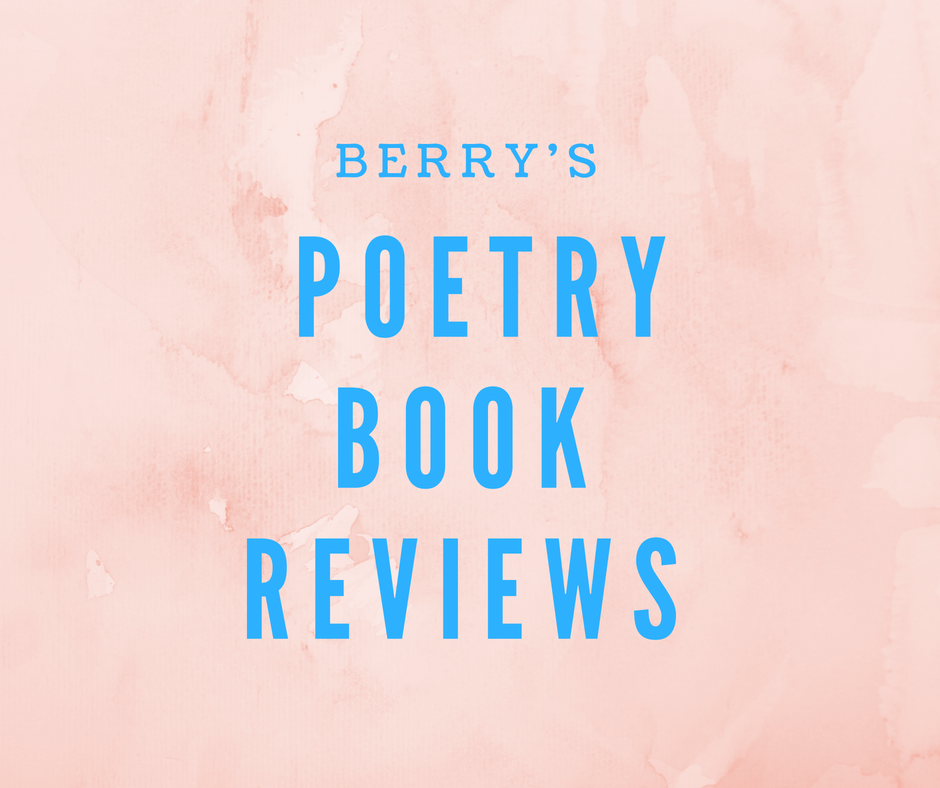Writers need to note that the way they interact with the world and describe it may not always be the case for their readers. And — reviewers are not some almighty being. Yes, they may influence but they don’t command people to read this book or that book. A review is a review. Bad or not, it gets the poet’s name out there.
Berry’s Poetry Book Reviews – 16 Apris 2019
About Reviewing
How did you get started?
I started this project in 2018 after delving into the online poetry community and seeing that there was an incredible need for poetry book reviews. Poetry is finding its place in the digital age but reviews are still so helpful for readers to discover modern poets.
How do you review a book? Is it a read first, and then make notes, or do you make notes as you go along?
I make notes as I go through the book and then will pour through it again to let the poetry really saturate my mind.
What are you looking for?
Creative use of language, the main themes — how well the text can engage the reader.
If a book has a great plot, great characters, but the grammar is less than perfect, how do you deal with that?
Well, in the poetry world the rules of prose are exploded and expanded upon so I don’t really look for that. Obviously, there are traditional poetry forms. It is exciting to see how modern poets take those forms and make them their own, but on that same note it is exciting to see new forms of poetry emerge as well. That may be the best part of this project. I am exposed to so many styles that I, as a reader, may never have stumbled upon.
How long does it take you to get through, say, an eighty thousand-word book?
That entirely depends upon the subject matter.
How did you come up with your rating system, and could you explain more about the rating system?
I don’t have a specific rating system. I simply try to provide an honest explanation of the poetry submitted to me. Does it inspire emotion? Do the poems draw me in? Are there particular pieces I go back to over and over? In short, I suppose I am testing the magnetism of the poetry.
What advice could you give to authors looking to get their books reviewed?
Don’t give up when looking for reviewers! Always ask! The worst thing a reviewer can say to a review request is ‘no.’
Do you get readers emailing you and thanking you for a review?
I have on occasion and it is very sweet, but by no means mandatory. The reviews I provide are free of charge — the poets don’t owe me a thing.
My advice to authors on getting a ‘bad’ review (hasten to add that might mean a perfectly honest, well written, fair review – just bad from the author’s point of view) is to take what you can from it and move on. Under no circumstances to ‘argue’ with the reviewer – would you agree with that?
I would. I absolutely understand that a written work is essentially a child writers have created and feel extremely protective over, but children have to be set free from their parents at some point. Writers need to note that the way they interact with the world and describe it may not always be the case for their readers. And — reviewers are not some almighty being. Yes, they may influence but they don’t command people to read this book or that book. A review is a review. Bad or not, it gets the poet’s name out there.
About Reading
We talk a lot about writing here on the blog, and possibly not enough about reading, which is after all why we’re all here. Why do you think people love reading? We’re seeing lots of statistics that say reading as a pastime is dying – do you think that’s the case?
When I was a kid I ONLY read fantasy and mythology (devoured it really) because I saw it as an escape from a mundane life. Now as I’ve gotten older, I am turning into someone who solely reads non-fiction and poetry, because the real world is so much more fascinating than I ever gave it credit for when I was younger. Who needs non-existent dragons and wizards when you can read Carl Safina’s fascinating work about the animal kingdom or about Lucy Parsons in Jacqueline Jones’ Goddess of Anarchy?
I do believe that reading as a pastime is dying for many reasons, which is why I am so happy poetry is making a resurgence in the digital age. You can find many arguments for and against the quality of Rupi Kaur’s poems but no one can deny the massive impact her ability to combine poetry with social media has had on the public.
About Writing
What are the most common mistakes that you see authors making?
Having too little confidence in themselves.
We’re told that the first page, paragraph, chapter, is absolutely key in making or breaking a book. Agents typically request only the first five pages of a novel; what do you think about that? If a book hasn’t grabbed you by the first five pages, do you put it down?
That would make sense to me. And poetry has to grab you almost immediately. I try my best to give every book a fair shot. If it is a chapter book I will try to make it to the end of it before putting it on the chopping block. Of course, with the books submitted to me for review I make sure to read every poem.
Is there anything you will not review?
Poetry is the only type of work I am reviewing.
About Publishing
What do you think of the oft-quoted comment that the “slush-pile has moved online”?
The slush-pile goes everywhere we go.
Do you think attitudes are changing with respect to indie or self-published titles?
Yes. I think they are gaining more respect — especially if they are well executed. I believe that shows a special dedication by the author.
Do you have any ideas or comments on how the industry can ‘filter’ good from bad, aside from reviews?
I really wouldn’t know how. Judging a book by its cover has always been a method, but you may have an incredibly skilled artist creating a cover that disguises less than appealing contents. That’s the point of reviewers. They are the ones who will dig in and do the dirty work for the readers.
End of Interview:
Read Laura’s reviews at Berry’s Poetry Book Reviews.



